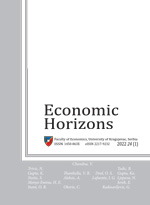THE WORLD ECONOMIC CRISIS AND ITS IMPACT ON THE SERBIAN ECONOMY
The financial crisis, which began in 2007 in the USA, led to a global recession and economic crisis. It shook the very foundations of the national market economy, spread to the international level, and brought into question the undisputed effectiveness of the free market. Some general assessment of the causes can be summarized to excessive deregulation of financial markets on the rising wave of business cycles, as well as poor or nonexistent coordination of financial and monetary policies at the international level.
Most governments have placed enormous financial resources for the stabilization of the financial system and the real sector of economy. Nevertheless, the recovery from the recession is going slowly, and only the beginnings of it are in sight.
The world economic crisis further reduces the possibility of getting out of the internal crisis in Serbia. The main negative effects of the global economic crisis on the Serbian economy can be summarized as: decline in foreign demand and fall of exports; the overall decline in production, especially manufacturing; decrease in the GDP growth rate and its shift towards negative values, while the latest improvements are slightly above zero; stubbornly high unemployment rates; withdrawal of capital from foreign-owned commercial banks and reduced investments in manufacturing; decreasing FDI inflow and bleak prospects for its growth in the short run; deterioration in the trade balance and balance of payments; and growth in total debt.
Key words: investment, financial markets, economic crisis, economic policy, economic recovery, economic growth
| Full Text |




